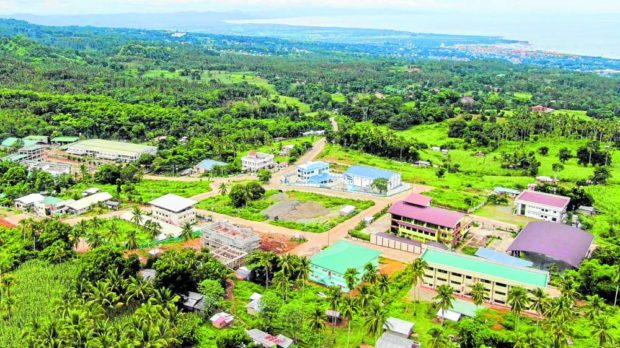Tug-of-war over seat of Zamboanga Peninsula region resumes

NEW SEAT The local government of Pagadian City has developed starting in 2005 a regional center site in Barangay Balintawak to host the national government offices being transferred from Zamboanga City, the erstwhile regional hub. Zamboanga now wants to get PHOTO FROM PAGADIAN CITY GOVERNMENT
PAGADIAN CITY—A three-decade tug-of-war between the cities of Pagadian and Zamboanga on where the seat of the Zamboanga Peninsula region should be has resumed, two years after former President Rodrigo Duterte hammered what was supposed to be the final nail to put the matter at rest.
Fresh discussions about the issue are expected to sprout after Zamboanga City Mayor John Dalipe recently wrote President Marcos to reverse the ongoing transfer of regional offices from there to this capital city of Zamboanga del Sur province.
Dalipe’s July 7 letter was premised on a resolution passed by the Zamboanga City Council on June 14 seeking to retain the regional center there.
But Pagadian City Mayor Samuel Co urged leaders of the region to put the matter to rest given that much has already been achieved in the transfer, and that significant government resources have also been spent for such purpose.
“Further delay would only confuse the public and affect the services that we ought to give to our people,” Co appealed.
Article continues after this advertisementAccording to Nelly Sisona, chief of Pagadian City’s coordinating office for the regional transfer, 61 of 65 offices that were mandated to transfer were already in the city as of July.
Article continues after this advertisementOf these, 22 are located inside the regional center site developed by the local government, 11 occupying their own buildings at the city center, and the rest still renting private spaces while awaiting the completion of their constructed buildings at the regional center site.Co said work on 10 buildings were ready to be bid out.
Prior to stepping down on June 30, acting Public Works Secretary Roger Mercado ordered the regional personnel to comply with Duterte’s directive.
30-year deadlock
Mercado was referring to Memorandum Circular No. 78 signed by Executive Secretary Salvador Medialdea, on behalf of the President, on June 25, 2020. It ordered the relocation of national government departments and agencies to Pagadian City within two years, except for the Departments of Trade and Industry, Labor and Employment, and Tourism.
The circular is the most recent policy directive on the transfer of the regional seat from Zamboanga to Pagadian, some 270 kilometers away.
In light of the creation of the Autonomous Region in Muslim Mindanao in 1989, the Mindanao regions were reorganized through Executive Order No. 429 issued on Oct. 12, 1990.
While Sulu and Tawi-tawi provinces were no longer with Western Mindanao, or Region 9, Lanao del Norte and Misamis Occidental initially joined it, giving practical reasons to relocate the regional seat to make it closer to constituent localities while also dispersing economic opportunities. Both provinces eventually opted out of Region 9.
The order to move the offices was only issued on Nov. 12, 2004, through EO 75, and the relocations began in 2005. By Dec. 22, 2010, MC 11 was issued, imposing a moratorium on the transfer. MC 78 lifted this moratorium.Boost local economy
Eager to host the more than 3,000 regional employees in the city, which bolstered local economy, the local government offered to take care of some logistical requirements of the transfer.Hence, it acquired the lots that now constitute the regional government center site in Barangay Balintawak.
Sisona told the Inquirer that as of mid-2020, Pagadian ha already spent around P1.1 billion since 2005 to cater to the needs of the relocating offices and their employees.
During their first two years in the city, the local government contributed to expenses in building repairs and furnishings, electricity, water, and rent, Sisona added.
It even provided free bus trips on Fridays and Sundays for employees who travel home to Zamboanga for the weekend.